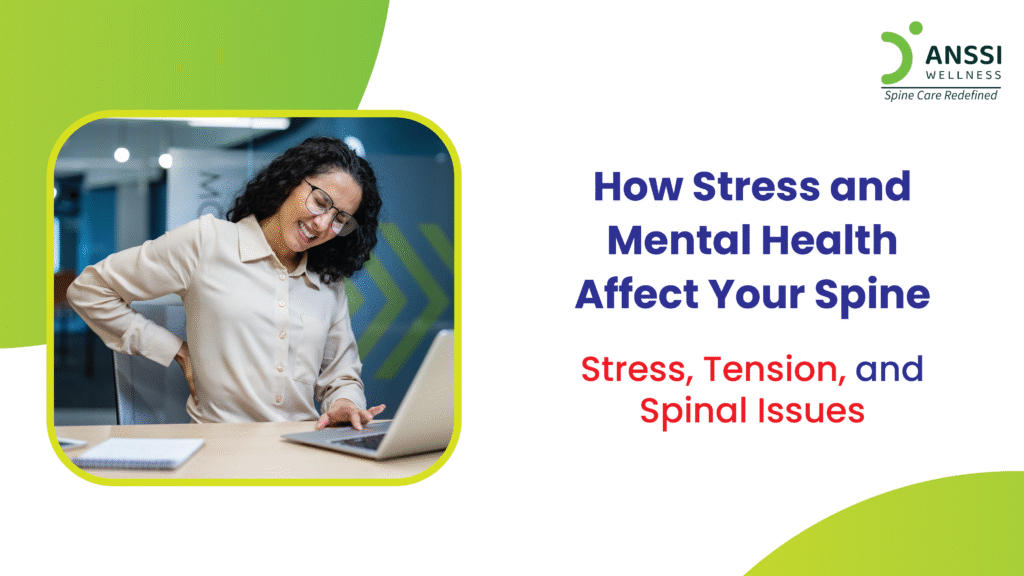Stress is an unavoidable aspect of living in the fast-paced world of today. While we often associate stress with emotional or mental strain, its impact goes far beyond mood changes and anxiety. One of the lesser-known effects of chronic stress is its influence on spinal health.
The link between stress, mental well-being, and physical conditions such as back and neck pain is strong and often underestimated. Let’s explore how stress affects your spine and how you can manage it to maintain better overall health.
The Mind-Body Connection
Your mind and body are deeply interconnected. When you’re under stress, your body enters a state of “fight or flight,” releasing stress hormones like cortisol and adrenaline. These hormones increase your heart rate and muscle tension, particularly in areas like the neck, shoulders, and lower back. While this response is helpful in emergencies, chronic activation due to long-term stress can be harmful.
Muscles that remain tense for long periods can become fatigued and sore, leading to stiffness and restricted spinal mobility. Over time, this muscle tension can alter your posture and even contribute to degenerative spinal conditions. The longer the tension persists, the greater the risk of developing chronic spinal pain.
Common Spinal Issues Linked to Stress
Stress doesn’t just make you feel emotionally drained, it can also cause or worsen a range of spinal problems. Some common spine-related issues influenced by stress include:
- Tension Headaches: Often caused by tight neck and upper back muscles.
- Cervical Spondylosis: Stress-induced muscle tension can exacerbate existing wear and tear in the neck vertebrae.
- Upper and Lower Back Pain: Muscle clenching from stress can compress spinal discs and strain ligaments.
- Herniated Discs: Chronic stress weakens spinal muscles, increasing the risk of disc problems.
- Myofascial Pain Syndrome: Stress can trigger pain in sensitive muscle areas, known as trigger points.
Additionally, mental health conditions such as anxiety and depression can amplify your perception of pain, making spinal discomfort feel more severe. They can also slow down recovery by affecting sleep quality and motivation to follow treatment routines.
Posture and Stress
Poor posture is one of the major ways that stress affects spinal health. When stressed, people often unknowingly adopt harmful physical habits:
- Slouching forward
- Clenching the jaw and shoulders
- Leaning to one side
- Sitting for long periods without moving
These habits create imbalances in spinal alignment and place undue pressure on certain muscles and discs. Over time, they can lead to structural issues such as kyphosis (rounded upper back) or forward head posture, both of which contribute to chronic neck and back pain.
It’s also worth noting that mental fatigue can lead to physical neglect. People under stress may skip exercise, sleep poorly, and spend long hours in poor ergonomic positions, further worsening spinal strain.
Managing Stress for a Healthier Spine
Fortunately, there are several non-invasive and holistic strategies that can help you manage stress and protect your spine:
1. Deep Breathing and Meditation
Mindfulness techniques help calm the nervous system and reduce muscle tension. Practising deep breathing for even 5-10 minutes a day can lower cortisol levels and relieve tension in the back and neck.
2. Regular Physical Activity
Low-impact exercises like walking, yoga, or swimming improve spinal flexibility, increase levels of endorphins (natural mood boosters), and reduce stress.
3. Posture Correction and Ergonomics
Use ergonomic chairs and maintain a good sitting posture at work. A neutral spine position and proper monitor height can prevent unnecessary strain.
4. Sleep Hygiene
A consistent sleep schedule and a supportive mattress can help reduce both physical and emotional stress, promoting spinal recovery overnight.
5. Physiotherapy
Targeted physiotherapy can address muscular imbalances, improve posture, and offer relaxation techniques such as guided stretches and myofascial release.
6. Non-Surgical Spinal Decompression Treatment
For those experiencing disc-related issues, non-surgical spinal decompression treatment offers a non-surgical way to relieve pressure on spinal nerves and discs. It promotes natural healing and reduces tension associated with stress-related spinal pain.
7. Counseling and Support
Don’t hesitate to seek psychological support if stress feels overwhelming. Cognitive Behavioral Therapy (CBT), for example, can help develop better coping mechanisms and reduce the physical effects of anxiety.
About ANSSI:
ANSSI Wellness focuses on improving the quality of life for patients suffering from spinal issues, aiming to provide relief where other conventional treatments have failed. Through advanced non-surgical spinal decompression treatment, ANSSI is committed to helping patients avoid surgery and recover in a safe, effective, and compassionate environment.
Connect with ANSSI Wellness on LinkedIn, Instagram, and Facebook for expert guidance.



